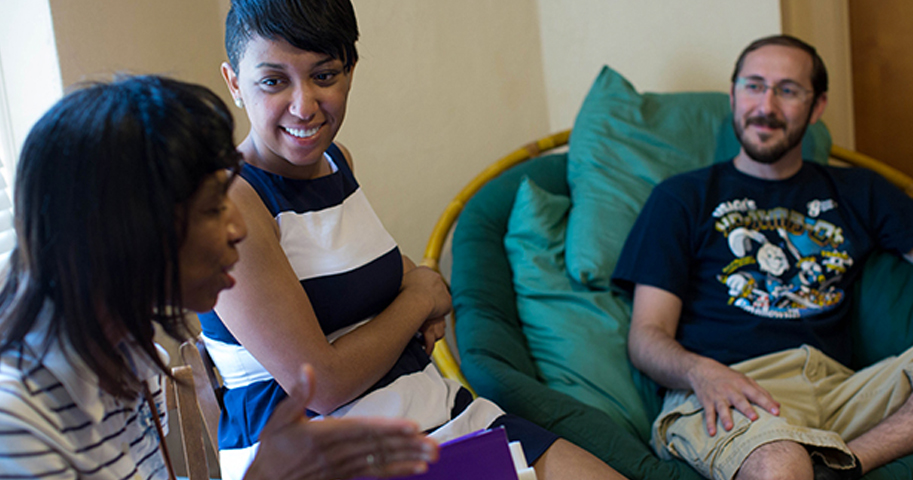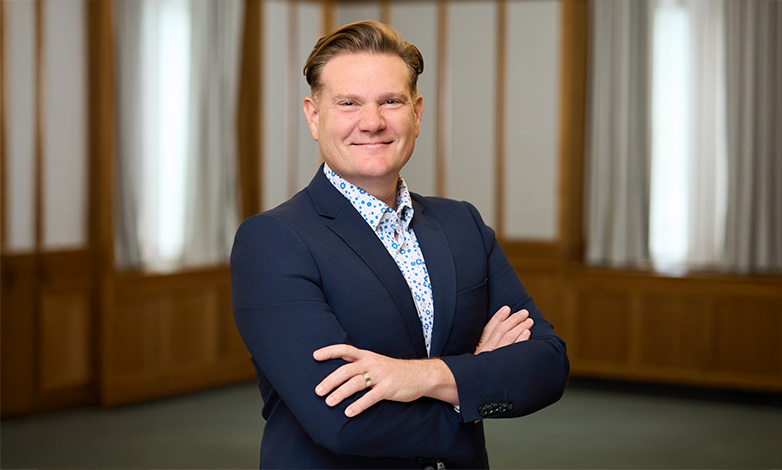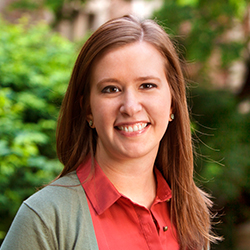Mental Health Concentration
The Mental Health concentration prepares students to address the complex needs of individuals and communities affected by mental health issues through evidence-based assessment and intervention strategies. With a strong emphasis on clinical social work practice, students gain the knowledge and skills needed to promote functional well-being at both the individual and systems level.
Students learn to engage, assess, and intervene across a range of practice settings—with individuals, families, groups, organizations, and communities. Alongside clinical training, students are also equipped to lead policy and systems-level reforms that foster equitable, accessible, and culturally responsive mental health services. The curriculum integrates both dominant and critical theoretical frameworks, encouraging students to critically examine and apply a range of perspectives that support recovery-oriented and person-centered care. Additionally, graduates are prepared to serve as effective practitioners and change agents in the evolving mental health landscape.
Working adults who need the opportunity to take courses in the evenings or over the weekend can pursue a Part-Time MSW in the Clinical Social Work track with this concentration. Learn more about the part-time curriculum structure and application process.
Alumni work in a wide range of settings, including community mental health centers; hospitals; private practice; and forensic, policy and research settings.
The Mental Health concentration has three tracks:
Clinical Social Work in Substance Use Disorder Treatment: for students who plan to work with older adolescents or adults experiencing substance use disorders; graduates are able to earn certification for the National Certification Commission for Addiction Professionals (NCCAP).
Clinical Social Work: for students who plan to work with older adolescents or adults experiencing mental health conditions through a direct practice lens.
Child Behavioral Health: for students who plan to work with children experiencing mental health conditions through a direct practice lens.

Career Paths
Recent graduates have been employed in positions such as:
- Clinical Case Manager
- Veterans Treatment Specialist
- Addiction and Treatment Center Director
- Family Therapist
- School Social Worker
- Crisis Intervention Clinician
- Integrated Health Specialist
Concentration Requirements: 15 Credits
Specific concentration coursework is determined by your selected track:
Clinical Social Work
- Contemporary Theories and Issues in Behavioral Health (3 credits)
- Behavioral Health Policies and Services (3 credits)
- Principles and Practices in Differential Diagnosis (3 credits)
- Principles of Clinical Interventions in Behavioral Health (3 credits)
- Principles, Practices, and Services in Substance Use Disorder Treatment (3 credits)
Child Behavioral Health
- Theoretical and Empirical Bases for Practice with Children, Youth, and Families (3 credits)
- Behavioral Health Policies and Services (3 credits)
- Principles and Practices in Differential Diagnosis (3 credits)
- Core Components and Skills for Trauma-Informed Practice (3 credits)
- Contemporary Family Therapy (3 credits)
Clinical Social Work in Substance Use Disorder Treatment
- Contemporary Theories and Issues in Behavioral Health (3 credits)
- Substance Use Policy (3 credits)
- Harm Reduction Community Practice (3 credits)
- Principles and Practices of Differential Diagnosis
- Principles, Practices, and Services in Substance Use Disorder Treatment
This track also requires that Foundation Practicum (360 hours), Concentration Practicum (600 hours), and one elective practicum credit (120 hours) are completed in an approved substance use disorder setting. This requirement is necessary for earning NCC AP credentials.
All students will also complete a leadership and management course, an evaluation course, and 9 credits of elective coursework. These elective credits can be used to broaden your expertise in other areas or to pursue additional mental health-related courses, such as:
- Cognitive Behavior Therapy (3 credits)
- Interpersonal Psychotherapy (3 credits)
- Contemporary Family Therapy (3 credits)
Concentration Practicum
The MSW program requires 600 hours of concentration practicum (in addition to 360 hours of foundation practicum). The concentration practicum must take place in a setting focused on mental health practice, management or advocacy.
Sample Mental Health practicum sites include:
- Veteran Affairs Medical Center (veteran focused services)
- Children’s Advocacy Center of St Louis (trauma-focused treatment)
- Perinatal Behavioral Health Services (hospital-based and community mental health treatment)
- Behavioral Health Network (community and provider systems linkage)
- Behavioral Health Response (BHR) (crisis helpline)
- Provident (crisis helpline and mental health treatment)
- Harris House Foundation (substance abuse treatment)
- The Community Reach (community-based mental health treatment)
- Healing Action Network (trauma-focused treatment)
- Annie Malone Children & Family Services (foster care mental health)
Concentration Chair

Ryan Lindsay is a professor of practice at the Brown School, where he also serves as the chair of the Mental Health concentration. A leader in clinical treatment of mental illness, Lindsay’s academic and practice interests center around improving access to trauma-informed and evidence-based mental health services.


“My passion is increasing access to mental health services. The most valuable part of my educational experience at the Brown School was the opportunity to personalize my curriculum. I was able to take classes that catered to my clinical focus, but that also gave me insight into policy and community organizing. I know that will be critical as I get further into my career.”
Julie Blatz, MSW ’13
Licensed Independent Clinical Social Worker Specializing in Dialectical Behavior Therapy